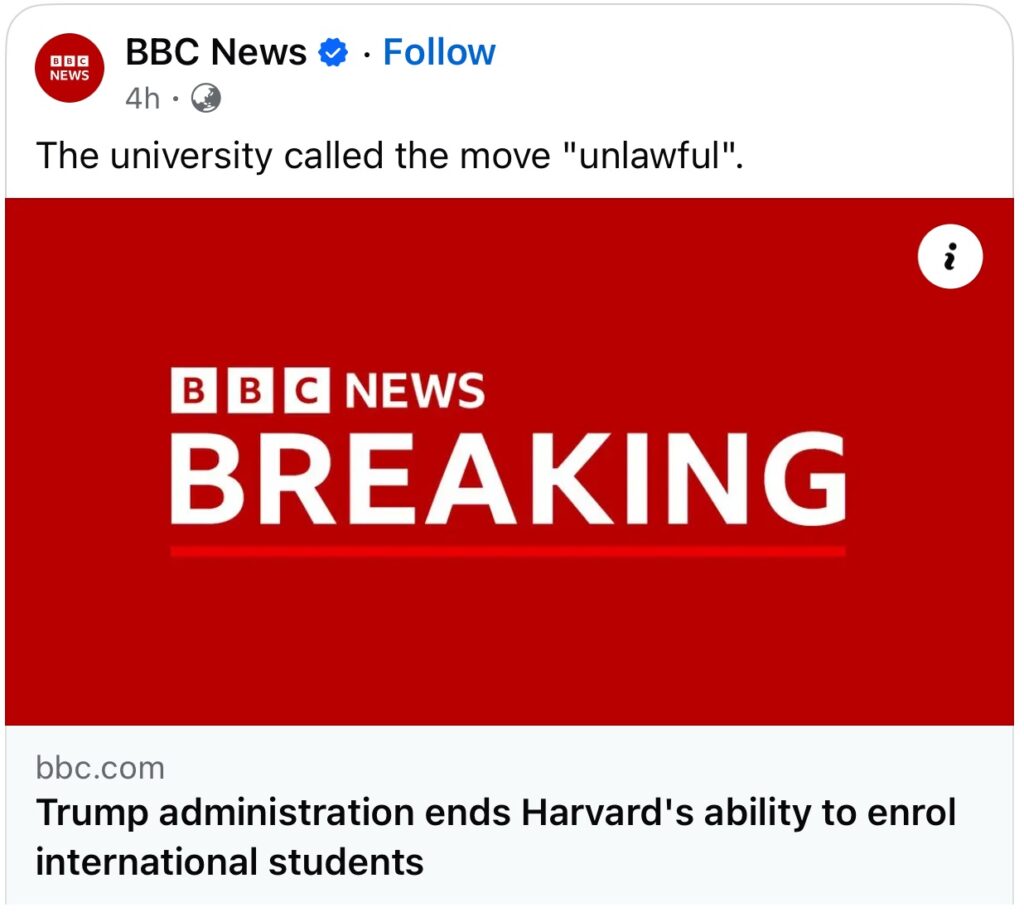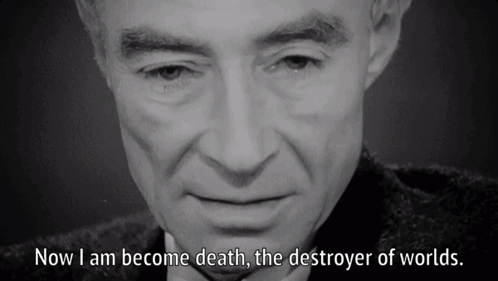Sepupus, it’s not every day that I am genuinely shocked by a piece of news.
It’s also not every day that I feel compelled to use an O.O react on Instagram.
Today’s news gave me both opportunities in a double-whammy perfect storm.

The Trump administration will be revoking Harvard’s ability to enroll international students.
You might think that this is a simple matter that affects just one generation of students, as Singapore’s Calvin Cheng hinted, but no, that’s not the case. It affects multiple generations of students, and not just the ones who are going over to Harvard, but also the ones who are currently there.
- Students who are currently enrolled at Harvard on student visas are being forced to transfer to other institutions or face visa termination. Even if they’re one semester from graduation, their legal status is now in jeopardy.
- Students who were recently accepted and expected to enroll in Fall 2025 will not be issued student visas through Harvard. Even if they have flights booked or housing arranged, they cannot enter the U.S.
- Students who are set to graduate this May might seem safe—but only conditionally. Those planning to stay in the U.S. under OPT (Optional Practical Training) could be blocked if their application depends on Harvard’s now-revoked SEVP certification.
- The SEVP termination means Harvard can’t issue I-20 or DS-2019 forms, which are essential for F-1 and J-1 visa processes. So even paperwork in progress may be frozen or voided.
- The revocation applies beginning in the 2025–2026 academic year, but its effects start immediately, especially for visa maintenance, transfers, and immigration compliance.
- The rationale given involves accusations of antisemitism and Chinese Communist Party coordination, but regardless of whether one agrees or disagrees with the reasons, the collateral damage is enormous.
- Harvard has pledged legal action and called the move “unlawful,” but unless it’s reversed fast, thousands of international students—past, present, and future—are caught in a geopolitical trap.
Depending on how you view the matter of academic freedom, this is…
Well, I know you all better than you think.
Most of you would probably immediately declare that this is unconscionable, an attack against freedom, a fight against the good of the world and the darkest evil – unstoppable sword, immovable shield, justice and destruction – the very recounting of the Bhagavad Gita itself by Robert J Oppenheimer (Harvard University 4.0 Summa Cum Laude I believe) himself when he said:

At the time that Oppenheimer had recounted these ominous words, nobody had died and it all seemed like a test that would merely remain a test.
Nothing really would happen, would it?
The United States wouldn’t dare use the atom bomb, would it?
Yet, on August 6, Little Boy dropped on Hiroshima, 80,000 people died.
On August 9, Fat Man dropped on Nagasaki, 40,000 people died.
Including long-term effects from radiation and injuries, the total death toll was estimated to be over 200,000.
What happened with Harvard may very well be one of those proclamations, except in slightly less poetic language, but with no less damage, including to many personal friends and acquaintances from Malaysia and beyond.
Now, I know what some of you might say: FAFO.
F*** Around and Find Out.
But I think it also illustrates a very interesting principle.
Freedoms can conflict – Or, as Joseph Stiglitz has noted, Isaiah Berlin had originated, and Anwar Ibrahim had misattributed at the Khazanah Megatrends Forum in 2024 (yes, I paid attention to your speech. I know exactly what you misquoted and when you misquoted it. It’s good that people pay attention sometimes isn’t it, Dato’ Seri?)
“Freedom for the wolves has often meant death to the sheep.”
You may agree or disagree with what is happening here, but really what is the most likely predictor of whether you would agree or not is not necessarily the reasoning that would be brought to bear in this decision, but instead the socio-cultural, religious, or ideological alignment with which you connect.
There is such a thing, of course, as freedom to speak.
But at the same time, there is such a thing as a freedom to not be harmed and to enjoy a peaceful and safe environment.
Now, to whom should we grant infinite blanket freedom to pursue their right?
For whom should society fight?
Should there be an arbiter to determine it?
Or should the two groups participate in a complete contestation, where in the inevitability of time, the clearest principle shall emerge as it has for the hundreds of generations that have come past.
The strong shall live, and the weak shall die.
I leave it to you to determine what strength should consist of.
“But wait!!! These things should not contradict!!!” say our woker class.
How fitting. It is after all only in the wokest yet ablest minds that sufficient room for mental gymnastics exists to transform these things into an amalgam of perfect compatibility.
Perhaps literature will result!
Something like Wael Hallaq’s Impossible State.
Something like a full on thesis on statehood, self determination, and society.
Well, let a million theologically irrelevant flowers bloom.
It is in those woke minds that the most narratives about one-sided injustice will be born, as will a hundred and maybe even a thousand statuses about how, allegedly, it didn’t start on October the 7th, even though, in a very real and practical sense, these people will deny aspects of the narrative that were not convenient to them in order to join the solidarity party and prune the stories that they considered unworthy or unfitting while looking in the mirror and telling themselves they were on the side of justice.
How adorable.
Well, I’m sure that if you own a superior mind to mine, you won’t be affected as you can see both sides and know well enough not to engage in a pointless(?) discussion.
Let’s be clear that the situation in Gaza is not conscionable, and it’s not something that people should accept, but what we see here is insane.
It is expansive, it is sweeping – it is on a whole new level.
To all of you who are affected by this and what the Trump Administration calls the “Big Beautiful Bill”, I am in no doubt that this will be a transitional or generational break for you. If the status quo holds, it is certain that things will change.
As I observed, many of you you are much smarter than me, both in the Naval Ravikant get-what-you-want-out-of-reality way and academically I am sure, and I am sure that you can adapt, but my condolences.
It is genuinely sad, it is genuinely unfortunate, and if this plays out in the way that the status quo suggests, it will be deeply deleterious to the lives of people I personally know, including many of the people I’ve talked to on this channel.
I mean this genuinely when I say that I am sure that you will adapt to something better, even if on the surface of things it appears that the sky and the world have just collapsed, and I hope all of you members of the audience will keep them in your prayers.
V.

